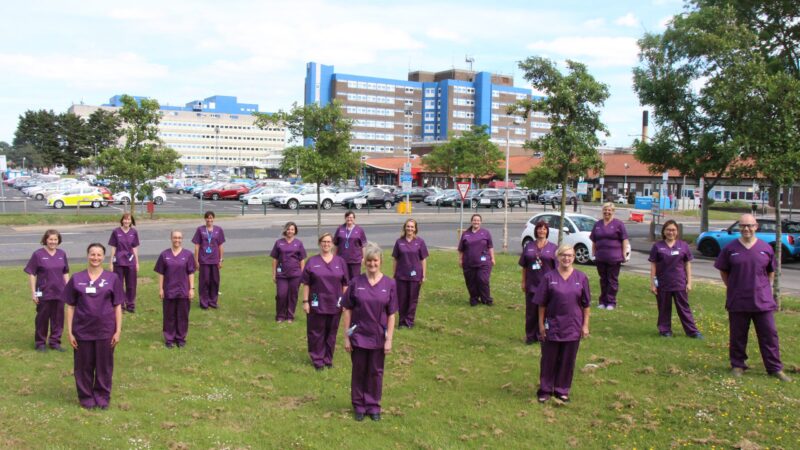
A treatment trialled on patients has been found to improve health outcomes of patients admitted to hospital with COVID-19.
The trial took place at the University Hospital of North Tees and was led at our Trust by the research and development team.
The Randomised Evaluation of COVID-19 Therapy (RECOVERY) trial has demonstrated that baricitinib, an anti-inflammatory treatment normally used to treat rheumatoid arthritis, reduces the risk of death when given to hospitalised patients with severe COVID-19.
The benefit was in addition to those of dexamethasone and tocilizumab, two other anti-inflammatory treatments which have previously been shown to reduce the risk of death in these patients.
Respiratory consultant Ben Prudon, the trust’s RECOVERY study lead, said: “Once again, this study has been successful in finding another effective treatment for COVID-19.
“The study has undoubtedly save lives and improved the health outcomes of so many people. We are honoured to have been able to play a part.
“Not only has it done this but it has also highlighted the incredibly important part that research plays in healthcare.
“By having research teams and volunteers who agree to take part, we can continue to cure diseases and improve people’s health.”
Testing treatments
The University of Oxford-led RECOVERY trial has been testing a range of potential treatments for patients admitted to hospital for COVID-19 since March 2020. Between February and December 2021, 4008 patients randomly allocated to usual care alone were compared with 4148 patients who were randomly allocated to usual care plus baricitinib. The dose of baricitinib tablets was 4mg once daily for 10 days (or until discharge from hospital if sooner). At randomisation, 95% of patients were receiving a corticosteroid such as dexamethasone, 23% were receiving tocilizumab, and 20% were receiving the anti-viral drug remdesivir. Two-thirds (68%) of patients were receiving oxygen and one quarter (27%) were receiving additional respiratory support.
Treatment with baricitinib significantly reduced deaths: 513 (12%) of the patients in the baricitinib group died within 28 days compared with 546 (14%) patients in the usual care group, a reduction of 13% (age-adjusted rate ratio 0.87, 95% confidence interval [CI] 0.77 to 0.98; p= 0.026). The benefit of baricitinib was consistent regardless of which other COVID-19 treatments the patients were also receiving, including corticosteroids, tocilizumab, or remdesivir.
Patients receiving baricitinib were also more likely to be discharged alive within 28 days (80% vs. 78%, age-adjusted rate ratio 1.10, 95% CI 1.04-1.15; p<0.001). Among patients not on invasive mechanical ventilation when entered into the trial, baricitinib reduced the chance of progressing to invasive mechanical ventilation or death from 17% to 16% (risk ratio 0.90, [95% CI 0.81 to 0.99], p=0.026). There was no evidence that the short course of baricitinib used in RECOVERY increased the risk of other infections or of thrombosis (complications of blood clotting).
RECOVERY considerably strengthens the evidence from earlier trials that baricitinib is beneficial in severe COVID-19, and provides new evidence of the additional benefit of baricitinib on top of other immunomodulatory treatments. RECOVERY is twice as large as the eight previous trials of baricitinib and similar drugs (known as JAK inhibitors) for the treatment of COVID-19 combined. Overall the nine trials, which involve about 12,000 patients, found that the use of baricitinib (or another JAK inhibitor) reduced deaths in patients hospitalised for COVID-19 by about one-fifth (rate ratio 0.80, 95% CI 0.71 to 0.89; p<0.001).
Sir Martin Landray
Sir Martin Landray, Professor of Medicine and Epidemiology at Oxford Population Health, and Joint Chief Investigator for RECOVERY, said: “It is now well-established that in people admitted to hospital because of severe COVID-19, an over-active immune response is a key driver of lung damage.
“Today’s results not only show that treatment with baricitinib improves the chances of survival for patients with severe COVID-19, but that this benefit is additional to that from other treatments that dampen down the over-active immune response, such as dexamethasone and tocilizumab.
“This opens up the possibility of using combinations of anti-inflammatory drugs to further drive down the risk of death for some of the sickest patients.”
Sir Peter Horby
Sir Peter Horby, Professor of Emerging Infectious Diseases in the Nuffield Department of Medicine, University of Oxford, and Joint Chief Investigator for RECOVERY, said: “This result confirms and extends earlier findings, providing greater certainty that baricitinib is beneficial and new data to guide the treatment of COVID-19 patients with a combination of drugs to dampen the immune response.
“As always, the next challenge is ensuring this and other COVID-19 treatments are available and affordable for everyone who can benefit, regardless of where they live.”